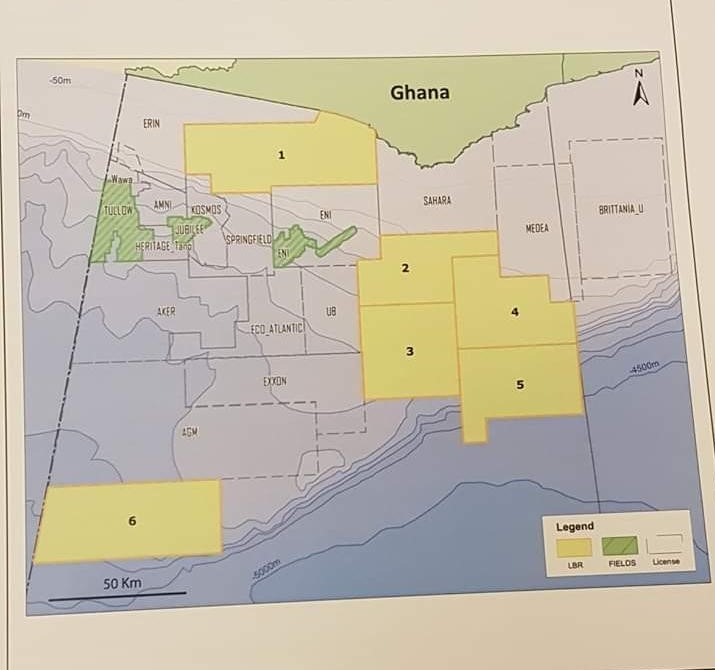The Oil Exploration and Production Act, 2016 (Act 919) provides that allocation of new exploration rights to prospective investors, should be done through an open, fair, transparent and public bidding process[1]. At the launch of the Licensing Bid Rounds and Negotiation (LBRN) Committee in Accra in October 2018, the President of Ghana charged the Ministry of Energy, the Petroleum Commission, Ghana National Petroleum Corporation (GNPC) to establish a Committee to ensure that all activities are carried out in a transparent and efficient manner. The Ministry of Energy which is spearheading the Committee has inaugurated the Committee to conduct the bid round. The committee will assess investors seeking to start oil exploration and production in Ghana, and advise the Minister before an agreement is entered. By this, the Ministry is moving away from the practice where oil blocks are awarded to companies without open bidding. The Committee is made up of 23 members, drawn from the Ministry of Energy, Ghana National Petroleum Corporation (GNPC), Environmental Protection Agency (EPA), Ghana Revenue Authority (GRA), Ministry of Finance, Attorney-General’s Department, Petroleum Commission and the Ghana Maritime Authority. ǼLEX has established close ties with the Ministry of Energy. Nine oil blocks have been mapped out in the Western Basin for allocation to companies interested in oil exploration. Out of the nine blocks, six would be allocated between 2018 and 2019 while the remaining three would form the basis for a second bid round.
Details of the blocks are as follows:
Block 1 Size: 1900 sq.km Water depth range: 0-100m Existing discoveries in block: none Existing wells in block: 1 Available data: 2D seismic, 3D seismic, well reports and cuttings
Block 2 Size: 1100 sq.km Water depth range: 50-1100m Existing discoveries in block: none Existing wells in block: 1 Available data: 2D seismic, 3D seismic, well reports and cuttings
Block 3 Size: 1380 sq.km Water depth range: 800-2800 m Existing discoveries in block: none Existing wells in block: 1 Available data: 2D seismic, 3D seismic, well reports and cuttings
Block 4 Size: 1340 sq.km Water depth range: 100-1700m Existing discoveries in block: 1 (Dzata) Existing wells in block: 2 Available data: 2D seismic, 3D seismic, well reports and cuttings
Block 5 Size: 1360 sq.km Water depth range: 1600-4800m Existing discoveries in block: 1 (Dzata) Existing wells in block: 1 Available data: 2D seismic, 3D seismic, well reports and cuttings
Block 6 Size: 1800 sq.km Water depth range: 2200-4300m Existing discoveries in block: none Existing wells in block: 1ODP site Available data: 2D seismic.
It has been further clarified that three blocks (blocks 2, 3 and 4) would be allocated through open competitive tender; two blocks (blocks 5 and 6) would be given through direct negotiations, while block one would be reserved for the national oil company, Ghana National Petroleum Corporation (GNPC).
GNPC is expected to explore its block in partnership with a chosen strategic partner with the view to developing its technical capacity to become an Operator. This year’s (2018) Licensing Rounds will focus on the Western Basin because of the existence of infrastructure, including two gas pipelines to the shore, three production facilities (FPSOs) with a fourth FPSO in the offing by 2021. These assets could facilitate the development of any discovery made in the area and ensure the quick development of hydrocarbons, maximizing value while minimizing cost. The overall effect is increased revenue to the state and development benefits to the people of Ghana.
The Terms of Reference for the Committee are as follows:
- Prepare all the necessary documentation for a successful bid round;
- Access and package all the data on nominated acreages;
- Set up online data room where all the data can be accessed by prospective bidders;
- Embark on promotions and roadshows in collaboration with the Petroleum Commission;
- Invite bids from prospective applicants;
- Carry out pre-qualification of applicants in line with applicable regulations;
- Evaluate qualified bids and select winners in line with a transparent criteria;
- Negotiate with the winners and provide recommendations to the Minister for the execution of Petroleum Agreements.
[1] Section 10(3) of Act 919 
